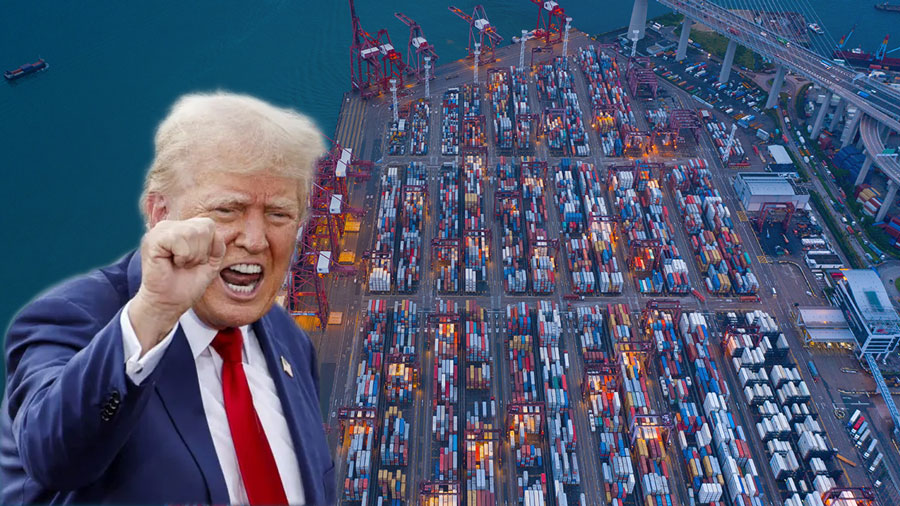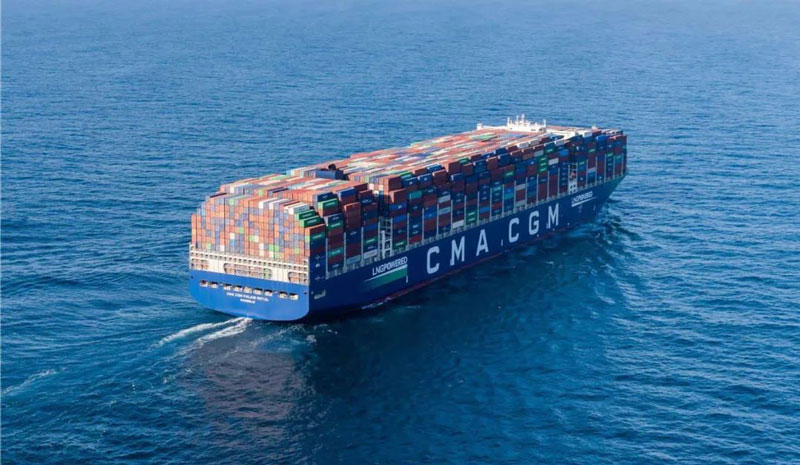

CMA CGM has voiced discontent over Trump's policies
The Trump administration's policy of imposing fees on Chinese-made ships calling at US ports will have a profound impact on the global shipping industry, with ZIM shipping set to be hit particularly hard. While the world's three largest container lines - Maersk Line, CMA CGM and Mediterranean Line - have the largest number of Chinese-made vessels on US routes, Alphaliner says they have the flexibility to move vessels around in response to possible policy changes. In addition, French shipping giant CMA CGM has criticized the US policy move, expressing concerns about the possible negative impact.
Of the 488 ships that called at U.S. ports in February, 190 were built in China, or 19 percent of the total, the data showed. In contrast, South Korea built more ships, accounting for 54.5 percent of the total. However, the proportion of Chinese-made vessels is higher for certain shipping companies, such as Israel's Star steamship, which has the majority of its vessels on U.S. routes built in China.
The Trump administration's proposed fee standard is $1.5 million per port call, a high fee that will undoubtedly increase the operating costs of shipping companies. Of the three shipping companies with the most Chinese-built vessels on US routes, Mediterranean Line is by far the largest on those routes, while Maersk Line and CMA CGM Lines also have large numbers of Chinese-made vessels.
While these companies have vast fleet resources that can be mobilized flexibly to ensure that China-related vessels do not sail to the United States, Israel's Star ships do not have the same option. Most of the Chinese-built vessels in its fleet are 5,315-7,800TEU in size and have only recently been on long-term leases from owners such as Seaspan or Navios. As Star Ships deploys 48% of its fleet capacity on the Asia-North America route, redeployment options are very limited.
In contrast, Mediterranean Shipping (MSC), while it also has a significant number of "Chinese-built vessels" calling at U.S. ports, can more easily divert those vessels to other routes and replace them with vessels built in other countries. In February, MSC had a total of 91 vessels calling at U.S. ports, of which only 13 were from Chinese shipyards.
In the face of this Trump administration policy, a wide range of stakeholders - in particular shipping companies and shipping associations such as the Baltic International Shipping Council and the World Shipping Council - have submitted scathing comments to the United States Trade Representative (USTR). They noted that such a policy would deal a major blow to the global shipping industry, increasing operating costs and ultimately being passed on to consumers.
French container shipping giant CMA CGM and the World Shipping Council (WSC) on Monday jointly voiced strong criticism of U.S. President Donald Trump's proposal to impose high fees on merchant ships built or ordered from China to call at U.S. ports.
Cma CGM, the world's third-largest container shipping company by capacity, shares the World Safety Council's deep concerns about the USTR proposal. On the last day of submission, more than 500 feedback were submitted from various industries.
The Wall Street Journal reported that the additional fees incurred by Chinese-built ships calling at US ports could be prohibitively high, reaching "astronomical figures." If a container ship is built in China but operated by a non-Chinese operator, it could cost an average of $4,530 per container to call at six U.S. ports, the group calculates. If the ship is also operated by a Chinese operator, the cost will further increase to $6,341 per container. WSC warns that these additional costs will ultimately be borne by the average American consumer.
Cma CGM's consultation paper further states: "With the exception of brief exceptional periods during the COVID-19 pandemic and the Houthi crisis in the Red Sea, container shipping has long been a low-margin industry. So any new or additional costs are ultimately passed on to customers." This view further underlines the far-reaching impact that Mr Trump's proposals could have on the global shipping industry and US consumers.

Of the 488 ships that called at U.S. ports in February, 190 were built in China, or 19 percent of the total, the data showed. In contrast, South Korea built more ships, accounting for 54.5 percent of the total. However, the proportion of Chinese-made vessels is higher for certain shipping companies, such as Israel's Star steamship, which has the majority of its vessels on U.S. routes built in China.
The Trump administration's proposed fee standard is $1.5 million per port call, a high fee that will undoubtedly increase the operating costs of shipping companies. Of the three shipping companies with the most Chinese-built vessels on US routes, Mediterranean Line is by far the largest on those routes, while Maersk Line and CMA CGM Lines also have large numbers of Chinese-made vessels.
While these companies have vast fleet resources that can be mobilized flexibly to ensure that China-related vessels do not sail to the United States, Israel's Star ships do not have the same option. Most of the Chinese-built vessels in its fleet are 5,315-7,800TEU in size and have only recently been on long-term leases from owners such as Seaspan or Navios. As Star Ships deploys 48% of its fleet capacity on the Asia-North America route, redeployment options are very limited.
In contrast, Mediterranean Shipping (MSC), while it also has a significant number of "Chinese-built vessels" calling at U.S. ports, can more easily divert those vessels to other routes and replace them with vessels built in other countries. In February, MSC had a total of 91 vessels calling at U.S. ports, of which only 13 were from Chinese shipyards.
In the face of this Trump administration policy, a wide range of stakeholders - in particular shipping companies and shipping associations such as the Baltic International Shipping Council and the World Shipping Council - have submitted scathing comments to the United States Trade Representative (USTR). They noted that such a policy would deal a major blow to the global shipping industry, increasing operating costs and ultimately being passed on to consumers.
French container shipping giant CMA CGM and the World Shipping Council (WSC) on Monday jointly voiced strong criticism of U.S. President Donald Trump's proposal to impose high fees on merchant ships built or ordered from China to call at U.S. ports.

Cma CGM, the world's third-largest container shipping company by capacity, shares the World Safety Council's deep concerns about the USTR proposal. On the last day of submission, more than 500 feedback were submitted from various industries.
The Wall Street Journal reported that the additional fees incurred by Chinese-built ships calling at US ports could be prohibitively high, reaching "astronomical figures." If a container ship is built in China but operated by a non-Chinese operator, it could cost an average of $4,530 per container to call at six U.S. ports, the group calculates. If the ship is also operated by a Chinese operator, the cost will further increase to $6,341 per container. WSC warns that these additional costs will ultimately be borne by the average American consumer.
Cma CGM's consultation paper further states: "With the exception of brief exceptional periods during the COVID-19 pandemic and the Houthi crisis in the Red Sea, container shipping has long been a low-margin industry. So any new or additional costs are ultimately passed on to customers." This view further underlines the far-reaching impact that Mr Trump's proposals could have on the global shipping industry and US consumers.





